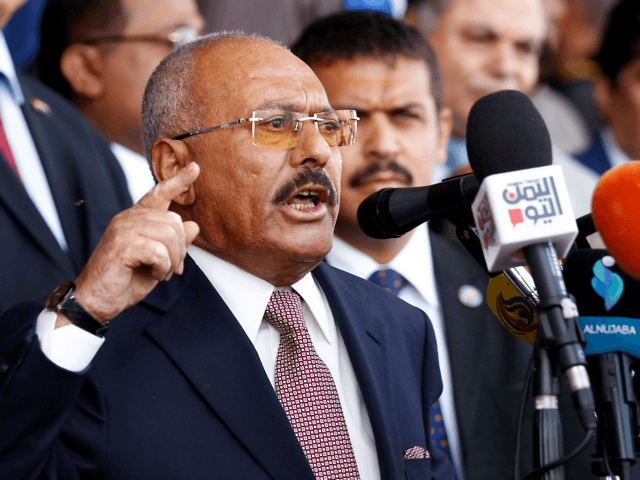The son of ex-Yemeni president Ali Abdullah Saleh has called for retaliation against the Iran-linked Houthi rebels who killed the former leader, accusing him of “treachery” for offering to “turn a new page” with the Saudi Arabia-led coalition fighting the Shiite insurgents in Yemen.
“I will lead the battle until the last Houthi is thrown out of Yemen … the blood of my father will be hell ringing in the ears of Iran,” Saudi-owned al-Ekhbariya TV quotes the former president’s son Ahmed Ali Saleh as saying, reports Reuters.
The son also reportedly urged his father’s supporters to “take back Yemen from the Iranian Houthi militias,” suggesting that he also abandoned his allegiance to the Shiite insurgents.
Reuters acknowledges that it could not immediately verify the authenticity of Ahmed Saleh’s comments to the Saudi-owned TV channel.
On Saturday, the late Saleh expressed a willingness to “turn a new page” with the Saudi Arabia-led Sunni coalition if it stopped targeting Yemen and ended its devastating blockade of the country.
In response, the Iran-allied Houthis accused their former ally Saleh of a “coup” against “an alliance he never believed in.”
Soon after storming his house on Monday, the Houthis announced the former president’s deaths.
Sunni Saudi Arabia and Shiite Iran are regional enemies.
Yemen, considered the poorest country in the Middle East even before the conflict, is home to one of the most violent proxy wars between the two nations, pitting the internationally recognized government of Yemeni President Abdrabbuh Mansur Hadi and his allies against the Houthis and their partners.
Ahmed Saleh, a former leader of the elite Republican Guards, has been in exile in the United Arab Emirates (UAE), a country that supports the Saudi Arabia-led coalition fighting against the Houthis to restore Hadi to power since March 2015.
Until recently, the late Saleh and his supporters were combating Hadi and the Saudi-led coalition alongside the Houthis.
The Saudi-led coalition officially entered the Yemen war in early 2015, soon after the Shiite rebels pushed the Hadi administration out of the Yemeni capital Sanaa.
In acknowledging Saleh’s death, the Sanaa-based Houthi interior ministry described the murder as “the killing of the leader of treachery and a number of his followers.”
Abdul Malik al-Houthi, the Houthi insurgents’ chief, accused Saleh of working with the Saudi-led coalition and hailed the killing of his former ally as a “great and significant occasion.”
Following a dispute over control of Sanaa’s biggest mosque last Wednesday, clashes erupted in Sanaa between the ex-president’s supporters and the Houthi militants.
The fighting resulted in 234 people killed and an estimated 400 injured, including 382 seriously wounded, wrote Robert Mardini, the International Committee of the Red Cross (ICRC) director for humanitarian assistance in the Middle East, on Twitter:
Terrible human cost from recent fighting in #Sanaa: 234 killed & 400 wounded (383 severely injured). ICRC-supported facilities received close to 70% of all casualties. Our @ICRC_ye teams are now doing all they can to supply hospitals with medicines, surgical materials and fuel.
— Robert Mardini (@RMardiniICRC) December 5, 2017
Saleh’s decision to try and reach a compromise with the Saudi-led coalition also fueled the battles between his supporters and the Houthis.
Reuters reports:
[T]he Houthis swiftly crushed a pro-Saleh uprising in the capital and shot him dead in an attack on his convoy.
Tens of thousands of Houthi supporters staged a rally in the capital on Tuesday to show support for their leader and celebrate the death of Saleh. They chanted slogans against Saudi Arabia and its allies.
According to the United Nations, the unrest in Sanaa had subsided by Tuesday, which is when Saleh’s funeral is expected to take place.
The war in Yemen has exacerbated what the United Nations describes as the world’s worst humanitarian crisis—reportedly fueled by one of the most terrible famines of modern times and the preventable scourge of cholera that has already killed more than 2,200 people, among other diseases afflicting the Yemeni population.
Although hunger and disease are expected to intensify and kill thousands, the warring parties have been blocking food and aid from entering Yemen, which has historically been mostly dependent on imported food and other supplies.
The death of the former Yemeni president further complicates the ongoing war in the Middle Eastern country.
“We expect things will get worse for us. This will be the beginning of a new conflict and more bloodshed. The war will not end soon,” Aswan Abdu Khalid, an academic at the University of Aden in Yemen, told Reuters.

COMMENTS
Please let us know if you're having issues with commenting.